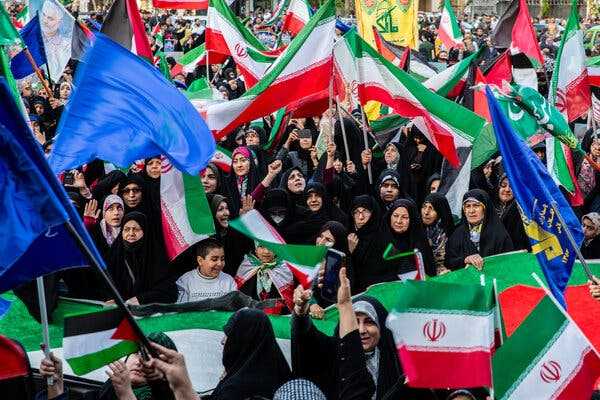The question is whether the successors to the president and foreign minister will take a similar path by keeping slivers of communication open, and avoiding direct conflict with the United States.
- Share full article

Celebrating Iran’s attack on Israel in Tehran last month.
In their three years in power, President Ebrahim Raisi of Iran and his equally hard-line foreign minister, Hossein Amir Abdollahian, did everything they could to consolidate the “Axis of Resistance” against the United States and Israel.
They funded Hamas and Hezbollah. They armed the Houthis, feeding the militia intelligence that fueled attacks on cargo ships in the Red Sea. They cracked down on dissent at home, launched Iran’s first direct missile attacks on Israel, after Israel killed several Iranian generals, and turned Iran into a “threshold” nuclear state that could produce fuel for three or four bombs in short order.
But for all those aggressive moves, the two men, both killed in a helicopter crash in the mountains near Azerbaijan on Sunday, were also careful.
Last week, days before their deaths, they approved talks with the United States through intermediaries aimed at making sure the war in Gaza was not the prelude to a wider war in the Middle East. And they stopped just short of making those bombs, at least as far as American intelligence agencies and international inspectors can determine.
The question now is whether their successors — almost certain to be from the same hard-line camp, American officials suspect — will show similar caution. And whether, in the cauldron of internal Iranian power plays, and an all-consuming presidential election in the United States, it will even be possible to keep up the sliver of communications between Washington and Tehran.
“The thing about Raisi was that he was the supreme leader’s man,” said Dennis Ross, the longtime Mideast negotiator, referring to Ayatollah Ali Khamenei, the 85-year-old head of state who has led the country since 1989. “He allows engagement, but no compromise. His team will inflict damage, but keep it within bounds. They don’t want a direct conflict with the U.S., which is the one thing that could threaten the regime. And I don’t expect that to change.”
We are having trouble retrieving the article content.
Please enable JavaScript in your browser settings.
Thank you for your patience while we verify access. If you are in Reader mode please exit and log into your Times account, or subscribe for all of The Times.
Thank you for your patience while we verify access.
Already a subscriber? Log in.
Want all of The Times? Subscribe.
SKIP ADVERTISEMENT
Source: nytimes.com



